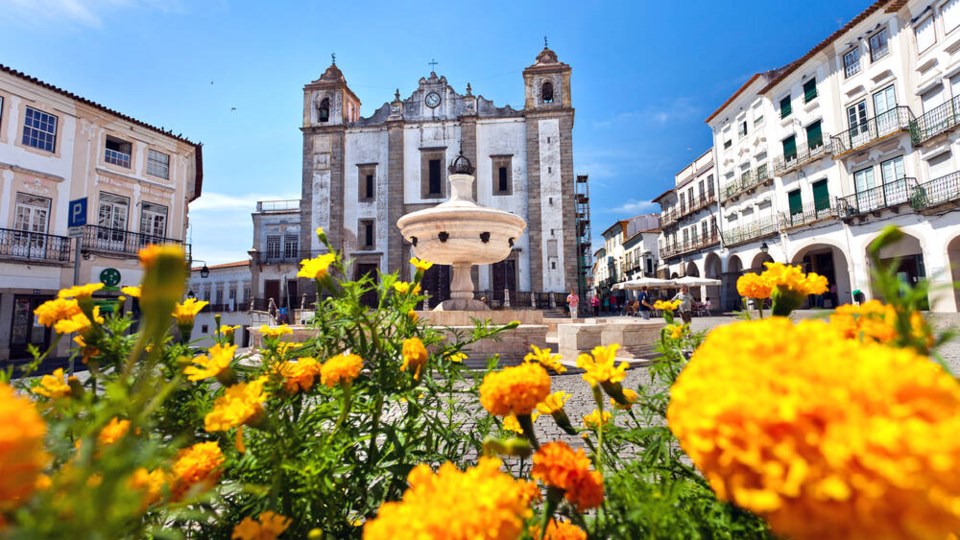Alentejo is a vast and arid land — the bleak interior of Portugal, where cork seems to be the dominant industry.
The rolling hills are covered with stubby cork trees. With their bark peeled away, they remind me of St. Bartolomeo, the martyr who was skinned alive. Like him, these trees suffer in silence.
The people of Alentejo are uniformly short. They seem to look at tourists with suspicion and are the butt of jokes in this corner of Europe. Libanio, my guide, circles the words “arid” and “suspicious” in my guidebook and does his best to turn my chapter into a promo for his dusty and downtrodden region. He says, “Must you say ‘arid’? Actually, in April, it is a lush countryside.” Then he adds, “But I won’t argue with ‘suspicious.’ ”
Libanio says it is a mark of a people’s character to laugh at themselves. He then tells me of an Alentejo man who nearly succeeded in teaching his burro to live without eating. He was so excited…until his burro died.
Libanio asks me, “How can you tell a worker is done for the day in Alentejo?” I say, “I don’t know.” He says, “When he takes his hands out of his pockets.” My guide continues more philosophically: “In your land, time is money. Here in Alentejo, time is time. We take things slow and enjoy ourselves.”
While this corner of Portugal is humble, there’s a distinct pride here. Every country has its Appalachia. I’m impressed when a region that others are inclined to insult has strong local pride, though I often wonder if it’s genuine pride, or just making the best of the cards they’re dealt.
For Alentejanos, quality and authenticity require the respect of tradition. The finest restaurants simply do not embellish a standard rustic dish. And they love their sweets so much that they seem to know the history of each tart.
Many pastries here are called “convent sweets.” Portugal, with its vast empire, once had access to more sugar than any other European country. Even so, sugar was so expensive that only the aristocracy could afford to enjoy it routinely. Historically, many daughters of aristocrats who were unable to marry into suitably noble families ended up in high-class convents. Life there was comfortable, yet carefully controlled. Instead of husbands, they could covet cakes and indulge in sweets. Over time, the convents became famous as keepers of wondrous secret recipes for exquisite pastries generally made from sugar and egg yolks (which were leftovers from the whites used to starch their habits). Barrigas de freiras (nuns’ tummies) and papos de anjo (angel’s double chins) are two such fancies.
Évora, the workaday capital of the region, is a fine place to taste the delights of Alentejo — both edible and historic, as well as musical and social.
Évora has barely any buildings over three stories high, but it is crowned by the granite Corinthian columns of a stately yet ruined ancient Roman temple. And just outside of town stand 92 stones three times as old as that, erected to make a Stonehenge-type celestial calendar.
I’m happy to find a romantic little restaurant that offers live fado music three nights a week. Esperanza, the woman who runs the place, explains that she likes the diners to be finished by 10 p.m. so the musicians can perform without waiters wandering around. I am impressed by her commitment to the art.
I sit in the back, enjoying the ambience. It’s been a long day, so during some applause, I sneak back out and head home. When I’m half a block away, Esperanza runs out the door and charges after me. I worry that she’s angry that I left without paying a cover charge, or that the door made too much noise, or that I had insulted the musicians. Like a guilty little boy, I nearly duck down an alley and run away. Then I decide to turn back and face the music.
She apologizes for not welcoming me and begs me to come back for a glass of port and to meet the musicians. The rest of the evening is a plush experience — complete with nuns’ tummies and angel’s double chins. Esperanza — whose name means “hope” — keeps the art of fado singing alive in Évora.
This article was adapted from Rick’s new book, For the Love of Europe.
Rick Steves () writes European guidebooks, hosts travel shows on public TV and radio, and organizes European tours. You can email Rick at [email protected] and follow his blog on Facebook.



